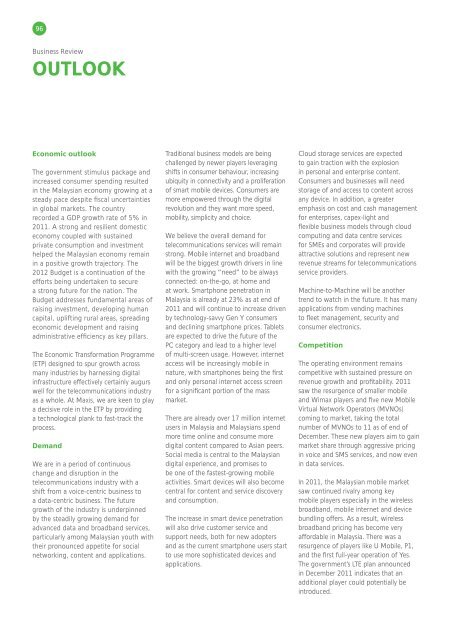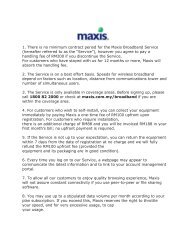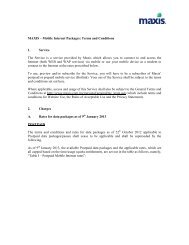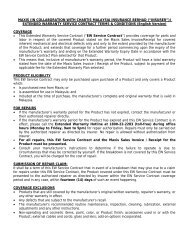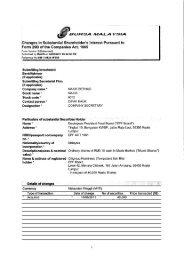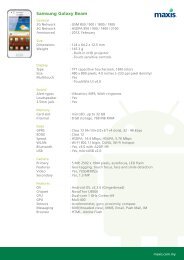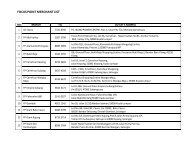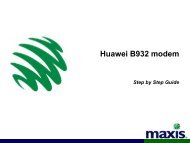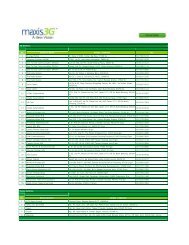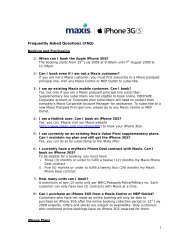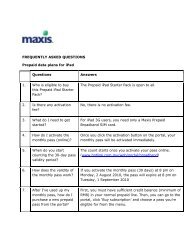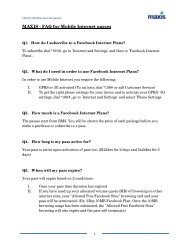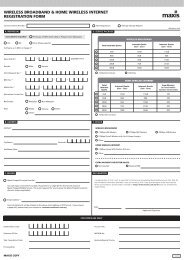ENRICHING LIVES EXPANDING HORIZONS - Maxis
ENRICHING LIVES EXPANDING HORIZONS - Maxis
ENRICHING LIVES EXPANDING HORIZONS - Maxis
You also want an ePaper? Increase the reach of your titles
YUMPU automatically turns print PDFs into web optimized ePapers that Google loves.
96<br />
Business Review<br />
OUTLOOK<br />
Economic outlook<br />
The government stimulus package and<br />
increased consumer spending resulted<br />
in the Malaysian economy growing at a<br />
steady pace despite fiscal uncertainties<br />
in global markets. The country<br />
recorded a GDP growth rate of 5% in<br />
2011. A strong and resilient domestic<br />
economy coupled with sustained<br />
private consumption and investment<br />
helped the Malaysian economy remain<br />
in a positive growth trajectory. The<br />
2012 Budget is a continuation of the<br />
efforts being undertaken to secure<br />
a strong future for the nation. The<br />
Budget addresses fundamental areas of<br />
raising investment, developing human<br />
capital, uplifting rural areas, spreading<br />
economic development and raising<br />
administrative efficiency as key pillars.<br />
The Economic Transformation Programme<br />
(ETP) designed to spur growth across<br />
many industries by harnessing digital<br />
infrastructure effectively certainly augurs<br />
well for the telecommunications industry<br />
as a whole. At <strong>Maxis</strong>, we are keen to play<br />
a decisive role in the ETP by providing<br />
a technological plank to fast-track the<br />
process.<br />
Demand<br />
We are in a period of continuous<br />
change and disruption in the<br />
telecommunications industry with a<br />
shift from a voice-centric business to<br />
a data-centric business. The future<br />
growth of the industry is underpinned<br />
by the steadily growing demand for<br />
advanced data and broadband services,<br />
particularly among Malaysian youth with<br />
their pronounced appetite for social<br />
networking, content and applications.<br />
Traditional business models are being<br />
challenged by newer players leveraging<br />
shifts in consumer behaviour, increasing<br />
ubiquity in connectivity and a proliferation<br />
of smart mobile devices. Consumers are<br />
more empowered through the digital<br />
revolution and they want more speed,<br />
mobility, simplicity and choice.<br />
We believe the overall demand for<br />
telecommunications services will remain<br />
strong. Mobile internet and broadband<br />
will be the biggest growth drivers in line<br />
with the growing “need” to be always<br />
connected: on-the-go, at home and<br />
at work. Smartphone penetration in<br />
Malaysia is already at 23% as at end of<br />
2011 and will continue to increase driven<br />
by technology-savvy Gen Y consumers<br />
and declining smartphone prices. Tablets<br />
are expected to drive the future of the<br />
PC category and lead to a higher level<br />
of multi-screen usage. However, internet<br />
access will be increasingly mobile in<br />
nature, with smartphones being the first<br />
and only personal internet access screen<br />
for a significant portion of the mass<br />
market.<br />
There are already over 17 million internet<br />
users in Malaysia and Malaysians spend<br />
more time online and consume more<br />
digital content compared to Asian peers.<br />
Social media is central to the Malaysian<br />
digital experience, and promises to<br />
be one of the fastest-growing mobile<br />
activities. Smart devices will also become<br />
central for content and service discovery<br />
and consumption.<br />
The increase in smart device penetration<br />
will also drive customer service and<br />
support needs, both for new adopters<br />
and as the current smartphone users start<br />
to use more sophisticated devices and<br />
applications.<br />
Cloud storage services are expected<br />
to gain traction with the explosion<br />
in personal and enterprise content.<br />
Consumers and businesses will need<br />
storage of and access to content across<br />
any device. In addition, a greater<br />
emphasis on cost and cash management<br />
for enterprises, capex-light and<br />
flexible business models through cloud<br />
computing and data centre services<br />
for SMEs and corporates will provide<br />
attractive solutions and represent new<br />
revenue streams for telecommunications<br />
service providers.<br />
Machine-to-Machine will be another<br />
trend to watch in the future. It has many<br />
applications from vending machines<br />
to fleet management, security and<br />
consumer electronics.<br />
Competition<br />
The operating environment remains<br />
competitive with sustained pressure on<br />
revenue growth and profitability. 2011<br />
saw the resurgence of smaller mobile<br />
and Wimax players and five new Mobile<br />
Virtual Network Operators (MVNOs)<br />
coming to market, taking the total<br />
number of MVNOs to 11 as of end of<br />
December. These new players aim to gain<br />
market share through aggressive pricing<br />
in voice and SMS services, and now even<br />
in data services.<br />
In 2011, the Malaysian mobile market<br />
saw continued rivalry among key<br />
mobile players especially in the wireless<br />
broadband, mobile internet and device<br />
bundling offers. As a result, wireless<br />
broadband pricing has become very<br />
affordable in Malaysia. There was a<br />
resurgence of players like U Mobile, P1,<br />
and the first full-year operation of Yes.<br />
The government’s LTE plan announced<br />
in December 2011 indicates that an<br />
additional player could potentially be<br />
introduced.


